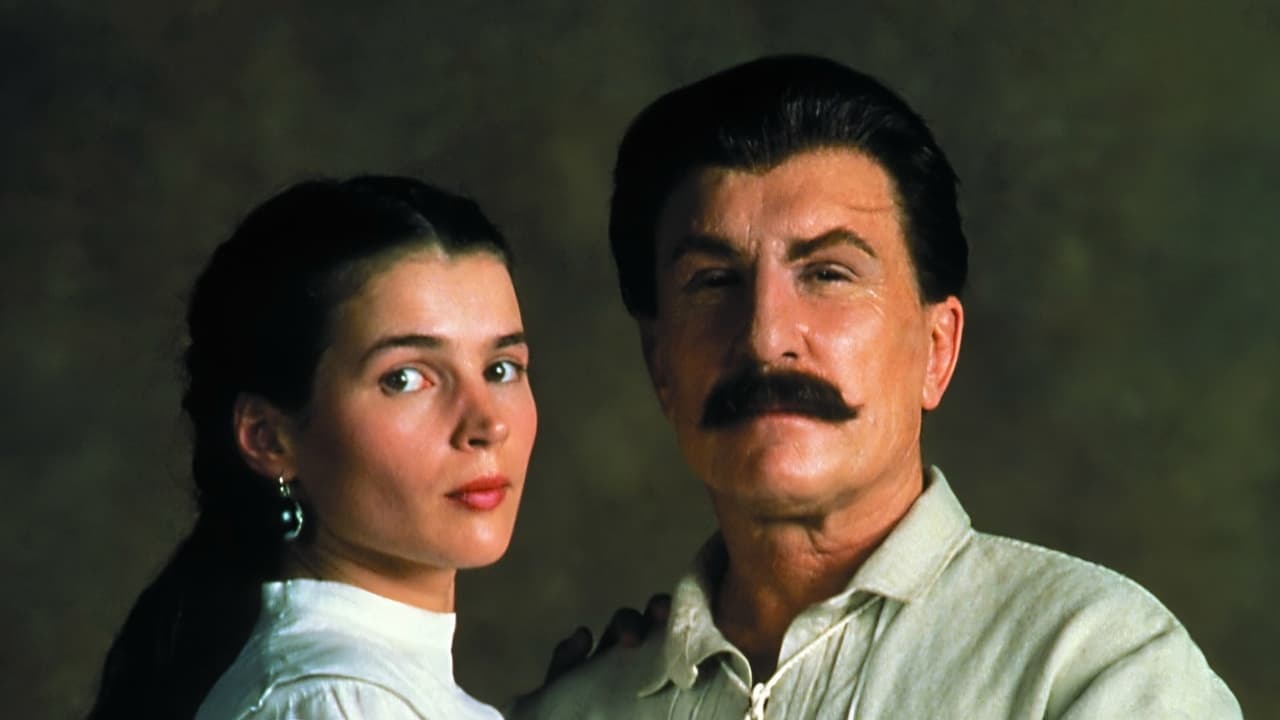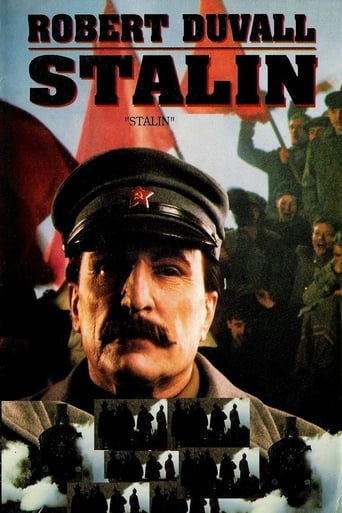

This is one of the better historical biopics. Robert Duvall manages to do a credible job in portraying the title character - Stalin. Not surprisingly, Duvall is in just about very scene, and he succeeds in doing credit to the role. He approximates Stalin, which is the most any actor could possibly do. The movie works because instead of sensationalizing Stalin's excesses, which are addressed in the movie, it instead deals with his personal behavior, especially his relationships, both personnel and professional, with those closest to him. The movie shows that Stalin was not incapable of love nor of empathy; it also shows that he revered Lenin and was committed to ensuring that Lenin's work continue. The movie also shows what was Stalin's fundamental character flaw - his inability to trust, the cause of which remains unknown. This flaw led to abuses of power that are perhaps unequaled in history. One of the more interesting features of Stalin was his tendency to rationalize his most outrageous and murderous decisions and repress his own feelings, the combination of which made him come off as cold and uncaring. For Stalin did care - about the preserving and protecting the revolution which he identified with himself. Stalin simply could nor separate himself personally from his work, and this distorted his relationships, causing him to do things that were, to say the least, hurtful. Stalin had a tendency to lash out at those closest to him, which made working with him challenging. The movie shows that one had to be careful as to how they acted and what they said around Stalin, because Stalin was looking for any excuse to prove you an enemy of the revolution, which in turn meant being his enemy. If one is interested in learning something about Joseph Stalin the person, then watch this movie.
... View MoreI watched Stalin and think that it is a good portrayal of Stalin's life. I would have liked to see more actors such as people playing Hitler instead of showing stock footage. One downfall of the movie was that it skips over Stalin's involvement in WWII and just starts the movie in 1917. I would have liked to see more of Stalin's childhood in the movie and maybe some cold war clips near the end of his life. Overall, I was pleased with the content. Stalin was one of the worst people to ever live, and this movie does well in showing how bad Stalin really was. I also like that the movie is told from the perspective of his daughter, Svetlana. This gives the movie a more personal touch to what his life was really like. The movie also used Robert Conquest as one of the contributors, which is good because he wrote Stalin: Breaker of Nations in 1992, also at the time of this movie.
... View MoreProbably one of the TV movies I had never heard about until I watched it 3 years ago in history class. This movie details the life of Joseph Stalin, the notorious Communist leader, brought to life by a stunning Robert Duvall who brings out his greatest performance ever.Narrated by Stalin's daughter Svetlana, this begins with Stalin joining Lenin and the Bolsheviks in their fight against the government, eventually setting up their own government themselves. Most of his biography is well known to us, however this movie brings out the character of Stalin as a psycho villain who did not trust a single person, not even his associates and took extreme measures to exterminate them all. His ego and paranoia alienated him from his friends and his family, even to the point where his wife (Julia Ormond) commits suicide and young Svetlana hating him. But in the end, he does not change and this leads to his downfall and death.Although the film does suffer in pacing, it is the performance of Robert Duvall that makes it worth watching. In my opinion, Duvall is simply the best actor out of the Godfather series, better than Brando, Pacino, De Niro or Caan. His performances are real and endearing as he simply becomes Stalin by portraying the ruthlessness and paranoia of the mad Communist dictator; a man who could not be solved by his friends or family, and who could not be controlled by anyone even himself. The supporting cast headed by Julia Ormond as Stalin's wife, Maximillian Schell as Lenin and Roshan Seth as Berin do well, but it is Duvall's show all the way. This TV movie is what is not shown in history textbooks. It is engaging and real, but not a masterpiece. History buffs will enjoy watching this, trying to put the pieces together about the madman known as Joseph Stalin.8 out of 10.
... View MoreThis is one of the rare biopics that offer less opinions and more facts. Over three hours long, the movie covers the dictator's life from his exile in Siberia when he took the name Stalin up to his death in 1953. It does not try to feature the then world politics and even contemporary Russia as a whole, nor it wastes further screen time on the social reaction to Stalin's policies too much. It features Stalin and only Stalin. It focuses exclusively on his personal life (naturally, since the movie is narrated by his daughter Svetlana) and his take on the fellow comrades of the party. And the filmmakers remain more-or-less true to the facts, giving neither imaginative shock moments nor just plain history.Robert DuVall looks nice as Stalin,and his performance is also satisfactory. But I don't know why he used that Vito Corleone accent on him. Did Stalin use to talk that way? I don't know. Julia Ormond does a really magnificent job as his second wife Nadya. Her timid yet free-spirited attitude is nicely portrayed by Ormond. And I also must mention Joanna Roth as Svetlana and Roshan Seth as Beria for a really good job. All the actors lift this movie up to a really higher level. Along with the flawless screenplay, acting is another asset of the film.
... View More